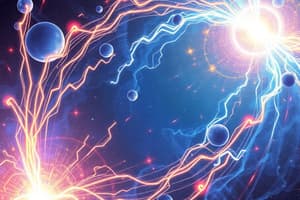Podcast
Questions and Answers
What does Newton's Second Law state?
What does Newton's Second Law state?
- Force equals mass times acceleration. (correct)
- The total momentum of a closed system remains constant.
- An object at rest stays at rest.
- For every action, there is an equal and opposite reaction.
Which branch of physics focuses on the motion of objects and the forces acting upon them?
Which branch of physics focuses on the motion of objects and the forces acting upon them?
- Classical Mechanics (correct)
- Thermodynamics
- Quantum Mechanics
- Electromagnetism
Which of the following equations represents Work done in physics?
Which of the following equations represents Work done in physics?
- $ W = F imes d imes rac{ heta}{2} $
- $ W = F imes d imes heta $ (correct)
- $ W = F imes d $
- $ W = rac{1}{2} mv^2 $
What principle describes the transformation of energy in a system?
What principle describes the transformation of energy in a system?
What is the value of the Speed of Light in m/s?
What is the value of the Speed of Light in m/s?
Which law states that the total momentum of a closed system remains constant?
Which law states that the total momentum of a closed system remains constant?
In which application of physics does the study of celestial bodies fall under?
In which application of physics does the study of celestial bodies fall under?
What formula relates Voltage, Current, and Resistance in an electrical circuit?
What formula relates Voltage, Current, and Resistance in an electrical circuit?
Flashcards are hidden until you start studying
Study Notes
Fundamental Concepts in Physics
-
Definition: Physics is the study of matter, energy, and the fundamental forces of nature.
-
Branches of Physics:
- Classical Mechanics: Motion of objects and forces acting on them.
- Thermodynamics: Heat, energy transfer, and the laws governing these processes.
- Electromagnetism: Electric and magnetic fields and their interactions with matter.
- Quantum Mechanics: Behavior of particles at atomic and subatomic levels.
- Relativity: Effects of gravity on time and space, formulated by Einstein.
Key Principles
-
Newton's Laws of Motion:
- First Law: An object at rest stays at rest, and an object in motion stays in motion unless acted upon by a net external force.
- Second Law: Force equals mass times acceleration (F = ma).
- Third Law: For every action, there is an equal and opposite reaction.
-
Conservation Laws:
- Conservation of Energy: Energy cannot be created or destroyed, only transformed.
- Conservation of Momentum: The total momentum of a closed system remains constant.
Key Formulas
-
Kinematics (for uniform acceleration):
- ( v = u + at ) (final velocity)
- ( s = ut + \frac{1}{2}at^2 ) (displacement)
- ( v^2 = u^2 + 2as ) (velocity relation)
-
Work and Energy:
- Work done: ( W = F \cdot d \cdot \cos(\theta) )
- Kinetic Energy: ( KE = \frac{1}{2}mv^2 )
- Potential Energy: ( PE = mgh )
-
Ohm's Law: ( V = IR ) (Voltage = Current x Resistance)
Important Constants
- Speed of Light (c): ( 3.00 \times 10^8 ) m/s
- Gravitational Constant (G): ( 6.674 \times 10^{-11} , \text{N m}^2/\text{kg}^2 )
- Planck's Constant (h): ( 6.626 \times 10^{-34} , \text{Js} )
Applications of Physics
- Engineering: Design and construction of structures and machines.
- Medical Physics: Utilization of physics in medical imaging and treatment.
- Astrophysics: Study of celestial bodies and the universe.
- Environmental Physics: Understanding environmental processes and energy efficiency.
Conclusion
Physics provides a foundational understanding of the universe, enabling us to explain natural phenomena and develop technologies that shape our lives.
Fundamental Concepts in Physics
- Physics is the study of matter, energy, and fundamental forces of nature.
- Major branches include:
- Classical Mechanics: Analyzes motion and forces on objects.
- Thermodynamics: Investigates heat, energy transfer, and related laws.
- Electromagnetism: Studies electric and magnetic fields and their interactions.
- Quantum Mechanics: Examines particle behavior at atomic and subatomic levels.
- Relativity: Addressed effects of gravity on time and space, introduced by Einstein.
Key Principles
- Newton's Laws of Motion:
- First Law: Objects remain at rest or in uniform motion unless acted upon by an external force.
- Second Law: Relates force, mass, and acceleration with the formula ( F = ma ).
- Third Law: States that for every action, there is an equal and opposite reaction.
- Conservation Laws:
- Conservation of Energy: Energy cannot be created or destroyed, only transformed.
- Conservation of Momentum: Total momentum in a closed system remains constant.
Key Formulas
- Kinematics (for uniform acceleration):
- Final velocity: ( v = u + at )
- Displacement: ( s = ut + \frac{1}{2}at^2 )
- Relation between velocities: ( v^2 = u^2 + 2as )
- Work and Energy:
- Work done: ( W = F \cdot d \cdot \cos(\theta) )
- Kinetic Energy: ( KE = \frac{1}{2}mv^2 )
- Potential Energy: ( PE = mgh )
- Ohm's Law: Relates voltage, current, and resistance with ( V = IR )
Important Constants
- Speed of Light (c): ( 3.00 \times 10^8 ) m/s, a fundamental constant in physics.
- Gravitational Constant (G): ( 6.674 \times 10^{-11} , \text{N m}^2/\text{kg}^2 ), essential for calculating gravitational forces.
- Planck's Constant (h): ( 6.626 \times 10^{-34} , \text{Js} ), crucial in quantum mechanics.
Applications of Physics
- Engineering: Applied in the design and construction of structures and machines.
- Medical Physics: Utilizes physics principles in medical imaging and treatments.
- Astrophysics: Studies celestial bodies and the universe's structure.
- Environmental Physics: Focuses on understanding environmental processes and promoting energy efficiency.
Conclusion
Physics serves as a fundamental framework for understanding universal principles, enhancing our ability to explain natural phenomena and innovate technologies that impact daily life.
Studying That Suits You
Use AI to generate personalized quizzes and flashcards to suit your learning preferences.




